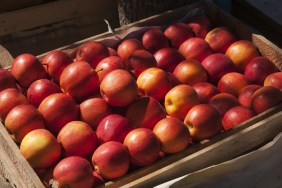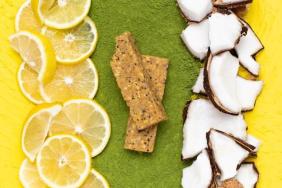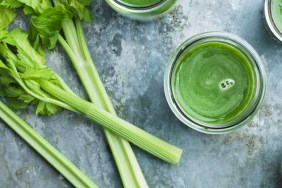One of the key factors to eating healthy on a budget is to eat in-season. It’s also the best way to get produce that will last longer and taste better. With that in mind, here’s a look at what to stock in your fridge now.
Asparagus: Loaded with fiber, folate, vitamins A, C, E and K, asparagus is also rich in chromium, a trace mineral that enhances the ability of insulin to transport glucose from the bloodstream into cells.
Greens (Kale, Spinach, Collard, Arugala, Chard): Full of vitamins, minerals and disease-fighting phytochemicals, greens are also rich in fiber and water to help control hunger and keep skin and hair hydrated.
Cauliflower: A good source of the anti-inflammatory nutrient vitamin K.
Rhubarb: The compounds that give rhubarb its bright red hue are the same antioxidants that help promote heart, eye and immune system health. The benefits are maximized when rhubarb is cooked.
Nectarines: Nectarines boast a wide range of the vitamins and minerals our bodies need every day, including lutein, which is getting increasingly more attention for its ability to promote healthy skin and hair by helping to destroy free radicals.
Fava Beans: Fava beans are rich in folate, which supports the function of the nervous system and aids in the synthesis of DNA, RNA and red blood cells. Folate has also been to shown to help decrease the risk of heart disease, cancer and depression, and pregnant women who have a high intake of folate are thought to be less likely to have children with birth defects.
Grapefruits: Popular among those looking to lose weight, grapefruits have not only been shown to curb appetite because of compounds that aid in fat burning and stabilizing blood-sugar levels, but they are also loaded with antioxidants, particularly in the dark red varieties.
Fiddleheads: Loaded with potassium, copper, iron, manganese, omega-3 and omega-6 essential fatty acids.
Apricots: High in vitamin A, which promotes good vision, apricots are also high in fiber and beta-carotene, which helps lower the bad LDL cholesterol, thereby helping to prevent heart disease.
Bananas: Often recommended as pre-workout fuel, bananas not only supply energy, but will help sustain your blood sugar. They’re also full of potassium, an essential mineral for maintaining normal blood pressure and heart function, and they’re rich in a compound that has been shown to help the body’s ability to absorb calcium.
Morels: Vitamin D is not found in many foods, especially not plant-based ones, making morels a particularly worthy addition. Vitamin D is essential for calcium absorption; it also helps regulate blood pressure and stimulates messenger cells in the immune system.
Strawberries: Loaded with vitamins and fiber, strawberries have one of the highest antioxidant capacities of any fruit and a single serving (about eight strawberries) has more vitamin C than an average orange.
Raspberries: Raspberries boast a wide variety of antioxidant and anti-inflammatory phytonutrients. There are also new studies that suggest they may be very helpful in managing obesity and blood sugar.








